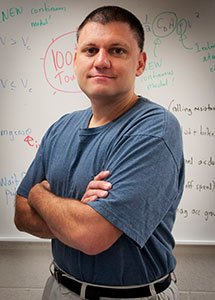 Physics professor John Eric Goff’s new research on the revolutionary Brazuca soccer ball has made him one of the go-to experts with media covering soccer’s 2014 World Cup underway in Brazil.
Physics professor John Eric Goff’s new research on the revolutionary Brazuca soccer ball has made him one of the go-to experts with media covering soccer’s 2014 World Cup underway in Brazil.
The author of Gold Medal Physics: The Science of Sports, Dr. Goff has done research with colleagues Takeshi Asai and Sungchan Hong at the University of Tsukuba in Japan that indicates that the design of the new Bruzuca ball will result in its having superior stability over the Jabulani ball used in 2010 World Cup in South Africa.
Dr. Goff was most recently interviewed by The Chronicle of Higher Education on his cool academic job and NPR for Morning Edition on the Brazuca and is currently featured on Discovery News, the science and technology website for The Discovery Channel. In this article, he explains the science behind modern soccer ball dynamics and outlines the wind-tunnel experiments that comprise the basis of the researchers’ findings.
Dr. Goff has been interviewed about his research on the World Cup ball by numerous news and sports outlets including Soccer.com, WPOV in Washington D.C., and on All Things Considered with Melissa Block on NPR.
Additionally, more than 100 media outlets picked up a story published by Reuters news after Dr. Goff wrote a piece on the Brazuca for Live Mint, a newspaper in New Delhi, India (affiliated with The Wall Street Journal).
The Brazuca is the 12th official World Cup ball designed by Adidas and features six propeller-shaped polyurethane patches that are thermally-bonded together. It has been called the most high-tech soccer ball ever made.
The controversy over the then-new Jabulani ball that was created for the World Cup in South Africa was the topic of Dr. Goff’s interview with National Public Radio’s Weekend Edition Sunday as a lead up to the World Cup final between Netherlands and Spain in the summer of 2010. Listen to the interview.
But soccer is not the only sport that has captured Dr. Goff’s attention. Since 2003, he has been predicting winning times for the stages of the Tour de France with impressive accuracy. During the last two years, the predictions for most stages have averaged within five percent of the winning time, with some coming in under one percent. For those that have missed the mark, Dr. Goff explained, “If there’s a crash or it’s raining, that’s always a good explanation of why we might be a little bit off,” he said, noting that one year a strong tailwind significantly reduced the cyclists’ times.
Dr. Goff encourages his best students to do research with him. This year, rising sophomore Chad Hobson is working with the physics professor on the Tour de France research. (Read our story about Chad here.) Over the last two summers, the physics department chair worked with physics major Brian Ramsey to predict the winning times of the stages of the world’s most famous bike race.
Currently working on a textbook on the physics of sports, Dr. Goff recently taught a class on the subject here for the first time. He is also writing a second book on the physics of Krav Maga, a martial arts system he studies at Super Kicks Karate in Forest.
Dr. Goff gave the keynote address at the International Sports Engineering Conference at the University of Massachusetts – Amherst in 2012 and is often called upon by media to explain how athletes are physically able to do what they do.
Dr. Goff will provide commentary on both the World Cup and the Tour de France on his blog, which has attracted traffic from 125 countries worldwide. This past winter, he appeared on All Things Considered on NPR to explain the physics of sports in following the Winter Olympics Games in Sochi. He was the featured guest for a week during the Olympics on the radio show The Takeaway, where he outlined the physics of various winter sports like skiing and was a major contributor to a multimedia piece on Olympic ski jumper Jessica Jerome appearing on the website of The New York Times.
As soccer’s World Cup kicks off this week in Brazil and the Tour de France gears up for its run into Paris next month, more stories featuring Dr. Goff are sure to appear via University of Lynchburg’s Facebook page and Twitter feed.

